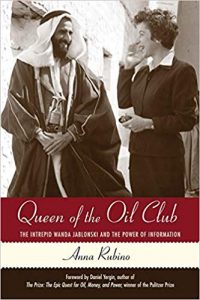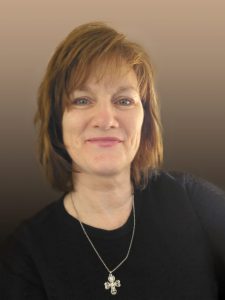 Editor’s note: I first connected with Rebecca when she contacted me after seeing a post on social media (where else?) about my book, The Addiction Spectrum. Addiction and recovery are among the interests Rebecca and I share. She’s also a PR professional, and she gave me great advice about how to let people know about my book in order to help more people trying to recover from addiction. Our friendship has continued to grow (virtually, as I’m in Oregon and she’s in Texas). We share articles about addiction and ideas about writing and other mutual interests. Rebecca’s been working on her book, Breaking the Gas Ceiling, as long as I’ve known her and I’m delighted it’s published now. She graciously agreed to be interviewed about women in the petroleum industry, the writing and publishing process, and more.
Editor’s note: I first connected with Rebecca when she contacted me after seeing a post on social media (where else?) about my book, The Addiction Spectrum. Addiction and recovery are among the interests Rebecca and I share. She’s also a PR professional, and she gave me great advice about how to let people know about my book in order to help more people trying to recover from addiction. Our friendship has continued to grow (virtually, as I’m in Oregon and she’s in Texas). We share articles about addiction and ideas about writing and other mutual interests. Rebecca’s been working on her book, Breaking the Gas Ceiling, as long as I’ve known her and I’m delighted it’s published now. She graciously agreed to be interviewed about women in the petroleum industry, the writing and publishing process, and more.
JM: What was the impetus for writing Breaking the GAS Ceiling?
Rebecca Ponton: I’ve been a freelance writer for over 25 years, and I became a petroleum landman eight years ago at the height of the Eagle Ford Shale boom in Texas.
In case your readers don’t know what a landman is, here’s the Reader’s Digest explanation: a landman—the term encompasses both men and women, something that doesn’t bother me in the least, as long as I’m being paid the same as the men and I always have been—is the person who runs title on a piece of property to determine who owns the mineral rights.
So you’re probably wondering why I became a landman?
JM: I am!
RP: A friend of mine, who’s a landman, needed help on a project and thought my journalism background would be a good fit for the research that’s necessary for title work. And she was right—I love going to the various courthouses and digging through dusty old ledgers dating back to the 1800s and following the chain of title as it changes hands from one person to another. I joke that it’s part genealogy and part detective work!
In my experience in courthouses in central and south Texas, landmen were pretty evenly split between men and women.
However, when I started attending oil and gas conferences, I noticed I was one of the only women in the room—and this was in 2011!
I knew there were women in the petroleum industry, but where were they?
As a journalist and avid reader, my first instinct is always to find a book about whatever topic interests me. In this case it was women in the petroleum industry.
I figured someone must have written about this but when I went looking for books—on-line, at the bookstore, at the library—I couldn’t find any!
 I eventually stumbled upon Anna Rubino’s fantastic biography of Wanda Jablonski, Queen of the Oil Club, which I would recommend to any journalist whether they’re interested in writing about oil and gas or not.
I eventually stumbled upon Anna Rubino’s fantastic biography of Wanda Jablonski, Queen of the Oil Club, which I would recommend to any journalist whether they’re interested in writing about oil and gas or not.
Later, Joan Eischen’s book, Energy and the City, came out.
And now we have Anomalies, Robbie Gries’ book about female petroleum geologists, and Carla Williams’ book, Wildcat Women, about the women—including Carla—who worked on the Trans-Alaska Pipeline in the late ‘70s, early ‘80s.
Slowly but surely, we’re building a body of work about women in the oil and gas industry, which is exciting to see!
But I digress, as I’m known to do . . . to answer your question: just seeing the lack of information about women in the oil and gas industry is what promptly me to start researching and looking for those women and you know what happens when a journalist starts researching.
Down the rabbit hole we go . . . And a book about women in the petroleum industry was born.
JM: What was the most surprising thing you found out about women in the petroleum industry while you were doing research?
RP:That, like everything else, women had been engaged in the industry in various capacities from the beginning—I’m talking mid-1800s—but didn’t receive the acknowledgement or credit they deserved.
It was fascinating to read about women in the 1800s running their own businesses, attending board meetings, going out into the field, particularly when you remember that American women didn’t gain the right to vote until 1920 and often couldn’t get a credit card in their own name without having a male co-signatory until 1974!
Emma McCutchen Summers (1858 – 1941), known as the Oil Queen of California, has a particularly interesting story.
Newspaper archives are a goldmine of information and I could have read and researched forever.
JM: You have said that originally the book was going to be a broad overview of women in the oil and gas industry. What made you decide to focus on women in the offshore sector?
RP: During my research, I came across a Scottish woman named Patricia (Pat) Thomson who, at the time, was 74 years old and still working offshore!
I read several articles about her and even discovered an incredible documentary called The Black Island (1994) by Dutch filmmaker Rob Rombout (who graciously sent me a copy because it’s not widely available), which features Pat and 80 men working offshore in the North Sea onboard the F.G. McClintock.
By the time I got in touch with Pat Thomson, first by e-mail and later by phone, she had been made redundant, but was eager—almost desperate—to go back offshore.
Not long after our interview, Pat had the opportunity come to the States and stay with me for a week.
Five years later, we remain friends.
After reading those first newspaper articles about Pat, I decided I had to learn more about a career that someone would be so enamored with that they would want to work past retirement age, particularly one where women comprise only 3.6% of the workforce.
(Overall figures for women’s participation in the oil and gas industry are somewhere between 15 – 22%, one of the lowest for a major industry.)
Women face obstacles in the workplace now, so I was curious to find out what it was like working in a male-dominated industry thirty or forty years ago.
Once I found Pat, so many other incredible stories followed. And I’m uncovering more untold stories all the time.
JM: What was your process in writing the book? How did you get started? And how did you juggle it with all your other deadlines?
RP: I definitely discovered my time-management skills need to improvement!
My original intention was to self-publish because I didn’t want to go through the process of shopping around for an agent, having the manuscript pitched to various publishers, etc.
But that also meant I didn’t have set deadlines, something that fed into my tendency to procrastinate. (Jennifer’s note: My aunt’s dear friend wrote an excellent and bestselling book about procrastination, worth reading if this is one of your challenges.)
In my defense, it was time-consuming to arrange interviews with 23 women around the world, many of whom are high-level executives with busy work schedules and families.
Occasionally, someone would drop out for whatever reason and then I would need to find another woman in the petroleum industry to interview.
In the end, I had to stop researching women in the petroleum industry and interviewing subjects and actually start writing!
I’m a night person, so I wrote after normal working hours until the wee hours of the morning.
JM: Your original intention was to self-publish, but you ended up with a small press. How did you find your publisher?
Prior to writing my own book, I lived vicariously through other authors as a book publicist.
An author had contacted me via LinkedIn and I helped her market and promote two of her books.
At that point, her publisher, Victor Volkman at Loving Healing Press, began sending other clients to me.
In working with Victor, I saw how committed he was to helping his authors be successful (whatever that means to someone—some people are just happy seeing their book in print, others want to use their book to build a platform as a speaker or authority on a particular subject).
This was in stark contrast to some of the horror stories you hear about publishers doing very little to support their authors after the book’s release.
The technical aspect of self-publishing had always made me nervous (I fretted about the pages being upside down or numbered wrong), so I asked Victor if he would be interested in a book about women in the petroleum industry and if he would consider publishing Breaking the GAS Ceiling under his Modern History Press division.
I was thrilled when he said, yes!
JM: Based on the subject matter, people might not think this is a book for general audiences. Is that a misperception? What about the book would be of interest to the average reader?
RP: The oil and gas industry, specifically the offshore sector, is simply the backdrop for these stories.
The value is in what we can learn from these women, who were among the first to break the “gas” ceiling, and this is something that is a missing part of the history of the energy industry.
I would hope that anyone interested in women’s stories, women’s history, women’s “firsts” or just women in general would want to read the book.
These women are an inspiration to us all and send a message to today’s young girls and women that anything is possible.
JM: I’ve saved the controversial question for last. I think we’re living in a time when a lot of people are advocating for sustainability practices that include getting away from non-renewable energy. How do you think the industry—and women in the industry—is going to change?
RP: There’s a perception that “Big Oil” doesn’t care about sustainability or the environment, but “Big Oil” is made up of people—men and women—who do want to help preserve the planet for the next generation, which is our children.
Finding those solutions and transitioning to renewable energies are going to require new ideas, new ways of thinking, and that’s why diversity and inclusion are so important to the oil and gas industry (to any industry, really).
Also, the skills and knowledge acquired from working in the O & G industry are transferrable to other energy sectors.
One of the women in the petroleum industry in my book, Abby Ross Hopper, is a perfect example.
At one point in her career, she was an energy advisor to then-Maryland Governor Martin O’Malley, focusing on his offshore wind policy.
She went on in 2015 to become the first woman director of the Bureau of Ocean Energy Management (BOEM), and in 2017 she became the first woman president and CEO of The Solar Energy Industries Association (SEIA).
That’s why it’s so important to tell the stories of the female pioneers: to show that women have reached the pinnacle of the industry and opened doors for other women along the way.
Maybe my next book will focus on the current female pioneers in the renewable energy industries!
JM: Sounds awesome, Rebecca! Thanks for taking the time to talk to me today.
RP: My pleasure. Thanks for having me.
 Rebecca Ponton is a freelance writer and book author. From 1992 to 2006, she lived in the Middle East in Dubai and Abu Dhabi, United Arab Emirates, and the Commonwealth of Independent States (CIS) in Baku, Azerbaijan and Almaty, Kazakhstan. Her writing has appeared in Texas Monthly, AAA Texas Journey, Ms. Magazine, MORE, National Geographic Traveler, CNN Traveller, and numerous Middle Eastern and international publications, including the IBTimes.com. Her work focuses on women’s achievements. Her new book is about women in the petroleum industry. For more info, click on www.breakingthegasceiling.com.
Rebecca Ponton is a freelance writer and book author. From 1992 to 2006, she lived in the Middle East in Dubai and Abu Dhabi, United Arab Emirates, and the Commonwealth of Independent States (CIS) in Baku, Azerbaijan and Almaty, Kazakhstan. Her writing has appeared in Texas Monthly, AAA Texas Journey, Ms. Magazine, MORE, National Geographic Traveler, CNN Traveller, and numerous Middle Eastern and international publications, including the IBTimes.com. Her work focuses on women’s achievements. Her new book is about women in the petroleum industry. For more info, click on www.breakingthegasceiling.com.
 This is a Spotlight Saturday post. Spotlight Saturdays showcase books and authors—both contemporary and classic. If you’re a published author with a new book coming out and you are interested in being showcased on JenniferMargulis.net, please ask your publicist to contact us.
This is a Spotlight Saturday post. Spotlight Saturdays showcase books and authors—both contemporary and classic. If you’re a published author with a new book coming out and you are interested in being showcased on JenniferMargulis.net, please ask your publicist to contact us.
Leave a Reply